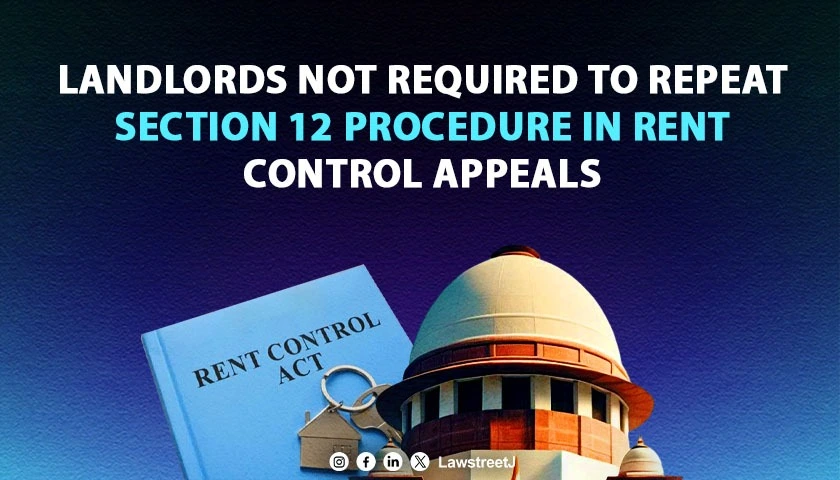New Delhi: The Supreme Court of India has delivered a significant judgment clarifying that landlords are not required to file fresh applications under Section 12(1) of the Kerala Buildings (Lease and Rent Control) Act, 1965 during appellate proceedings, emphasizing that laws must be interpreted as instruments of justice rather than sources of absurdity.
Justice Manmohan, writing for the bench, made crucial observations on the interpretation of rent control legislation and the balance between procedural requirements and practical justice.
The Court addressed Civil Appeal Nos. 13901–13902 of 2025 filed by P.U. Sidhique and others against Zakariya. Framing the issue at two levels, it observed:
“At the surface level, the issue that arises for consideration in the present appeals is whether the appellants-landlords, during the pendency of the appeals under Section 18, have to once again follow the procedure under Section 12 of the Act, 1965 by filing an application under Section 12(1). However, at a deeper level, the issue is whether laws are to be interpreted as a force for justice or not.”
The dispute involved two shops in Kochi, Kerala, taken on monthly rent. The tenant had defaulted on rent payments—since February 2020 for one shop and January 2020 for the other—despite monthly rents of ₹55,000 and ₹99,187 respectively.
The landlords filed eviction petitions in 2020 and secured a money decree in 2023 for ₹26,44,614, including interest and costs. On 25 September 2024, the Rent Controller directed the tenant to pay outstanding rents of ₹56,81,126.34 and ₹36,48,515.27 for the two shops, along with future rent. On the tenant’s failure to comply, eviction orders were passed on 7 November 2024 under Section 12(3).
The tenant appealed to the Rent Control Appellate Authority. On 11 March 2025, the Authority directed him to deposit the admitted rent by 15 March 2025 as a pre-condition for hearing the appeals, observing that since no application had been filed under Section 12(1), it was not passing any order regarding subsequent arrears.
When the tenant again failed to comply, the Authority on 19 March 2025 stopped the hearing of the appeals and directed execution of the eviction orders. The High Court, however, reversed this on 22 May 2025, holding that without a fresh Section 12(1) application before the Appellate Authority, proceedings could not be stopped.
The Supreme Court disagreed, emphasizing:
“Section 12(1) specifically stipulates that no tenant shall be entitled to contest either an eviction petition before the Rent Control Court or an appeal before the Rent Control Appellate Authority unless he has paid or deposited all arrears of rent admitted to be due, and continues to pay rent which may subsequently become due.”
Clarifying the Appellate Authority’s role, it noted:
“As the Rent Control Appellate Authority is not the court of first instance, it only tests the exercise of jurisdiction and power by the Rent Control Court. It is not required to re-determine the issue of default or outstanding rent.”
The Court rejected the High Court’s reasoning with an analogy:
“Accepting the High Court’s reasoning would lead to an absurd and unjust result, akin to suggesting that in an appeal challenging an order decreeing a suit under Order XII Rule 6 CPC, the respondent-decree holder would have to once again file an application under Order XII Rule 6 before the Appellate Authority.”
The Court further observed:
“Human beings—and not artificial intelligence or computers—are entrusted with the duties of administration of justice. Laws are to be interpreted with empathy and pragmatism, as a force for justice, not absurdity.”
It held that fresh applications under Section 12(1) during appeal are needed only when a supervening event occurs (e.g., rent was fully paid until the filing of the appeal but arrears accrue during pendency).
Addressing the Kerala High Court’s Full Bench judgment in Zeenath Ibrahim, the Court noted that while it clarifies that a Section 12(1) application is maintainable in an appeal, it does not mandate such applications in every case.
Highlighting the factual reality, the Court noted:
“The admitted position is that the respondent-tenant is occupying two premier shops in the heart of Kochi without paying a farthing for more than five years, despite a money decree and no stay in appeal.”
It criticized the tenant for abusing procedure:
“The respondent-tenant, by advancing procedural arguments, has turned the summary procedure on its head and managed to occupy the premises for several years without paying or depositing any rent.”
Final Order:
The Supreme Court set aside the High Court’s judgment dated 22 May 2025 and restored the Appellate Authority’s orders of 19 March 2025. The tenant was directed to hand over vacant possession by 31 December 2025, subject to filing an undertaking within two weeks to pay outstanding arrears; failing which, the landlords may execute the eviction decree immediately.
Mr. V. Chitambaresh, Senior Counsel, appeared for the landlords, while Mr. P.B. Krishnan, Senior Counsel, represented the tenant.
Case Title: P.U. Sidhique & Ors. vs. Zakariya
Citation: 2025 INSC 1340













